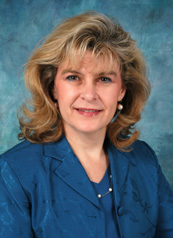 UNMC researchers are presenting important findings this week that could lead to dramatic changes in diagnosing and treating T-cell non-Hodgkin’s lymphoma.
UNMC researchers are presenting important findings this week that could lead to dramatic changes in diagnosing and treating T-cell non-Hodgkin’s lymphoma.
Julie Vose, M.D., chief of oncology/hematology at UNMC and principal clinical investigator for the T-cell non-Hodgkin’s Lymphoma International Trial, will present her findings Tuesday at the American Society of Hematology (ASH) meeting in Atlanta, Ga. The ASH meeting is the largest national meeting of hematologists in the United States.
“This is an important study because it’s the largest to date on T-cell non-Hodgkin’s lymphoma,” Dr. Vose said. “This form of lymphoma is quite rare and doesn’t respond to chemotherapy very well. T-cell non-Hodgkin’s lymphoma accounts for about 15 percent of all lymphoma cases, and has a 70 percent to 80 percent mortality rate.”
The goal of the study, she said, was to:
- Find out how often T-cell non-Hodgkin’s lymphoma is correctly diagnosed, and
- Study the effectiveness of current treatments.
The study showed that only 60 percent to 80 percent of patients were accurately diagnosed with the correct sub-type of T-cell lymphoma. There are about 20 different sub-types of T-cell lymphoma, so correctly diagnosing and treating this form of cancer is often difficult. Each sub-type carries a different prognosis and requires a specifically tailored treatment. Another key finding from the study, Dr. Vose said, was that none of the current standard-of-care treatments for T-cell non-Hodgkin’s lymphoma work well.
“This study will likely lead to new clinical trials in a number of areas,” she said. “We need to look at new chemotherapy agents and anti-body treatments for these lymphoma patients. Secondly, we found that patients who got stem cell transplants early in the course of their disease had a slightly better outcome. New clinical trials also are needed to find out whether stem cell transplants, in addition to chemotherapy, should be applied as the first line of treatment.”
In addition to Dr. Vose, Jim Armitage, M.D., UNMC professor of internal medicine, and Dennis Weisenburger, M.D., UNMC professor of pathology/microbiology, played key roles in the study. Dr. Weisenburger was principal investigator for hematopathology. As a result, he collected and reviewed pathological diagnosis information from 1,320 T-cell lymphoma patients worldwide. Medical institutions in North America, Europe and Asia gathered clinical data on the patients and sent the data to UNMC, where Dr. Weisenburger led the effort to evaluate the accuracy of the cancer diagnoses.
The abstract for the “T-cell and Hodgkins Lymphoma Chemotherapy Trials” has been submitted to Blood, a journal published by ASH. Dr. Vose says the study itself will be submitted for publication this spring.